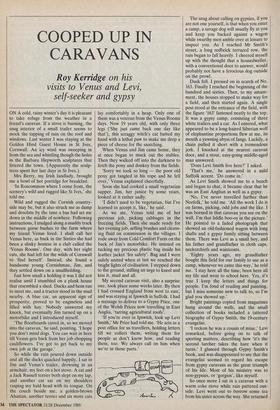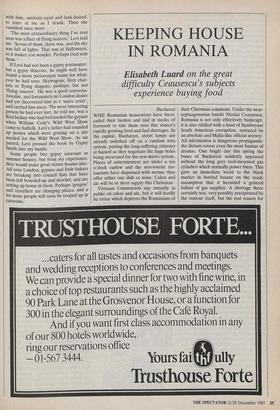COOPED UP IN CARAVANS
Roy Kerridge on his
visits to Venus and Levi, self-seeker and gypsy
ON A cold, rainy winter's day it is pleasant to take refuge from the weather in a friend's caravan. If a stove is burning, the snug interior of a small trailer seems to mock the tapping of rain on the roof and windows. Last winter I was staying at the Golden Hind Guest House in St Ives, Cornwall. An icy wind was sweeping in from the sea and whistling though the holes in the Barbara Hepworth sculptures that littered the town. (Apparently the sculp- tress spent her last days in St Ives.) Mrs Berry, my Irish landlady, brought me a bowl of hot porridge for breakfast.
`In Roscommon where I come from, the scenery's wild and rugged like St Ives,' she told me.
Wild and rugged the Cornish country- side may be, but it also struck me as damp and desolate by the time a bus had set me down in the middle of nowhere. Following instructions, I trudged along a muddy track between gorse bushes to the farm where my friend Venus lived. I shall call her Venus here, as back in the Sixties she had been a slinky hostess in a club called the `Venus Rooms'. One day, with her eight cats, she had left for the wilds of Cornwall to 'find herself . Instead, she found a handsome young Cornishman, Jim, and they settled down on a smallholding.
Just how small a holding it was I did not realise until I stumbled on a plank house that resembled a shed. Ducks and hens ran to meet me, and a tractor stood in the mud nearby. A blue car, an apparent sign of prosperity, proved to be engineless and filled with hay. Nobody answered my knock, but eventually Jim turned up on a motorbike and I introduced myself.
`The floorboards caved in, so we moved into the caravan,' he said, pointing. 'I hope you don't mind dogs. You can wait in here till Venus gets back from her job chopping cauliflowers. I've got to get back to my own job at the garage.'
So while the rain poured down outside and all the ducks quacked happily, I sat in Jim and Venus's trailer, drowsing in an armchair, my feet on a hot stove. A cat and a Jack Russell terrier both slept on my lap, and another cat sat on my shoulders rasping my bald head with its tongue. On the couch beside me, a golden-brown Alsatian, another terrier and six more cats lay comfortably in a heap. Only one of them was a veteran from the Venus Rooms days. Now 19 years old, with only three legs (`She just came back one day like that'), this scraggy witch's cat batted my hand with a lethal paw to make me drop a piece of cheese for the snatching.
When Venus and Jim came home, they at once began to muck out the stables. Then they walked off into the darkness to fetch the pony and donkey from the fields.
`Sorry we took so long — the poor old pony got tangled in his rope and he fell over,' Venus explained cheerfully.
Soon she had cooked a small vegetarian supper. Jim, her junior by some years, looked at it rather sadly.
`I didn't used to be vegetarian, Kit I've learned to accept it, like,' he said.
As we ate, Venus told me of her previous job, picking cabbages in the freezing fields. Then she made ready for her evening job, selling brushes and cleans- ing fluid on commission in the villages. I rode away from Cold Comfort Farm on the back of Jim's motorbike. He insisted on tucking my precious plastic bag inside his leather jacket 'for safety'. Bag and I were safely united when at last we reached the bright lights of civilisation. I stepped down to the ground, stifling an urge to kneel and kiss it, mud and all.
My second caravan visit, also a surprise one, took place some weeks later. By then I had crossed England from west to east, and was staying at Ipswich in Suffolk. I had a message to deliver to a Gypsy Price, one of the Welsh Prices now travelling in East Anglia, 'tarring agricultural roofs'.
'If you're ever in Ipswich, look up Levi Smith,' Mr Price had told me. 'He acts as a post office for us travellers, holding letters till we collect them, writing them for people as don't know how, and reading them, too. We always call on him when we're in those parts.' The snag about calling on gypsies, if you are not one yourself, is that when you enter a camp, a savage dog will usually fly at you and keep you backed against a wagon while swarthy men amble over at leisure to inspect you. As I reached Mr Smith's street, a long redbrick terraced row, the rain began to fall heavily. I cheered myself up with the thought that a housedweller, with a conventional door to answer, would probably not have a ferocious dog outside on the prowl.
Dusk fell. I pressed on in search of No. 163. Finally I reached the beginning of the hundred and sixties. Then, to my amaze- ment, the houses stopped to make way for a field, and then started again. A single post stood at the entrance of the field, with the figure '163' fastened neatly to the top. It was a gypsy camp, consisting of three white trailers and a car. As I entered, what appeared to be a long-haired Siberian wolf of elephantine proportions flew at me, its mouth a yawning abyss of fangs. Luckily, a chain pulled it short with a tremendous jerk. I knocked at the nearest caravan door, and a stout, easy-going middle-aged man answered.
`Does Levi Smith live here?' I asked. `That's me,' he answered in a mild Suffolk accent. `Do come in.'
As Levi Smith showed me to a bench and began to chat, it became clear that he was an East Anglian as well as a gypsy.
`No, I've never travelled further than Norfolk,' he told me. 'All the work I do is on farms, picking, odd jobs and the like. I was borned in that caravan you see on the wall. I'm that liddle boo-oy in the picture.' He pointed to a faded photograph that showed an old-fashioned wagon with long shafts and a gypsy family sitting between them. There was Levi as a small boy, and his father and grandfather in cloth caps, neckerchiefs and waistcoats.
`Eighty years ago, my grandfather bought this field for our family to use as a camp, whenever we came this way,' he told me. 'I stay here all the time; been here all my life and went to school here. Yes, it's true I keep the letters and things for people. I'm fond of reading and painting, but I miss someone new to talk to, so I'm glad you showed up.'
Bright paintings copied from magazines hung around the walls, and the small collection of books included a tattered biography of Gypsy Smith, the 19-century evangelist.
`I reckon he was a cousin of mine,' Levi remarked, before going on to talk of sporting matters, describing how 'it's the second lurcher takes the hare when it turns.' I glanced through Gypsy Smith's book, and was disappointed to see that the evangelist seemed to regard his escape from gypsy caravans as the great triumph of his life. Most of his ministry was to non-gypsies, or `gorgios', like myself.
So once more I sat in a caravan with a warm coke stove while rain pattered out- side. Levi went out to borrow some tea from his sister across the way. She returned with him, sardonic-eyed and lank-haired, to stare at me as I drank. Then she vanished once more.
`The most extraordinary thing I've ever seen was a fleet of flying saucers,' Levi told me. 'Seven of them, there was, and the sky was full of lights. That was at Halloween, so it makes you wonder. Perhaps God sent them.'
If Levi had not been a gypsy postmaster, but a gypsy illiterate, he might well have found a more picturesque name for what- ever he had seen. Skywagons, fiery char- iots or flying dragons, perhaps, but not flying saucers'. He was a good conversa- tionalist, and fortunately no London dealer had yet discovered him as a 'naive artist', and carried him away. The most interesting person he had ever met, he told me, was a Red Indian who had befriended the gypsies when William Cody's Wild West Show came to Suffolk. Levi's father had rounded UP ponies which were grazing on a site needed for the Wild West Show. As we parted, Levi pressed the book by Gypsy Smith into my hands. Some people buy gypsy caravans as summer houses, but from my experience, they would make good winter houses also. All over London, gypsies and Irish tinkers are breaking into council flats that have been left boarded-up and derelict, and are setting up home in them. Perhaps `gorgios' and travellers are changing places, and a i lot more people will soon be cooped up in Caravans.



















































































 Previous page
Previous page